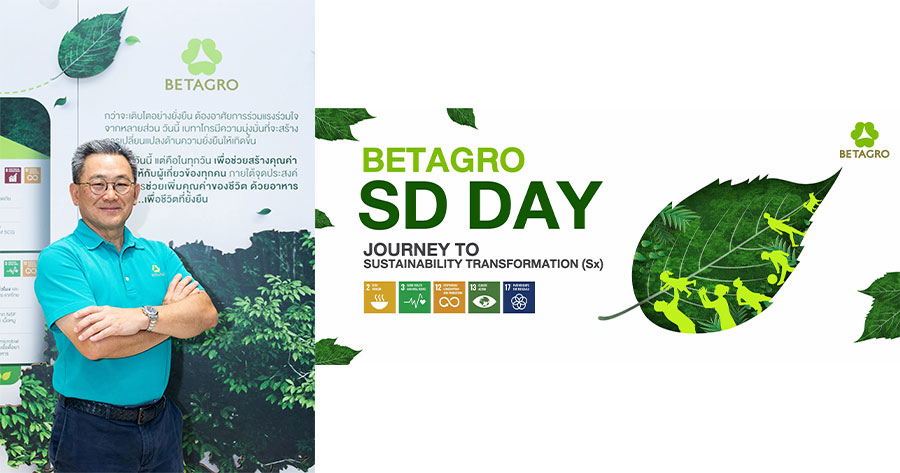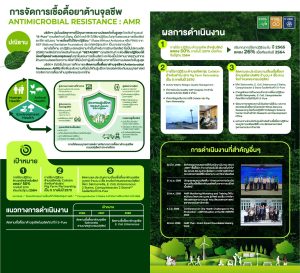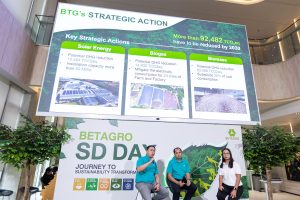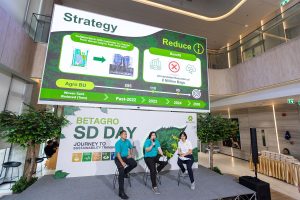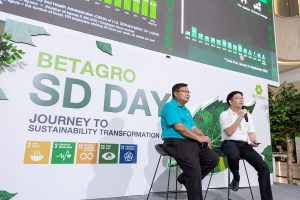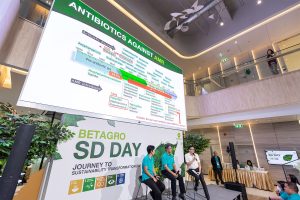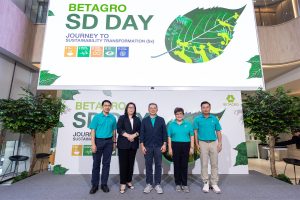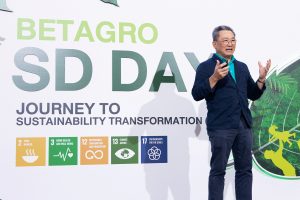Betagro Public Company Limited (SET: BTG), Thailand’s leading integrated food company, organized “BETAGRO SD DAY 2023” to announce its direction of sustainable development that aligns with the United Nations Sustainable Development Goals (SDGs) and ESG (Environmental, Social, and Governance) framework. It showcases five sustainability strategies, covering 1) Food quality and safety, 2) Climate change management, 3) Community development, 4) Sustainable packaging development, and 5) Occupational health and safety. It reaffirms the organization’s purpose to enrich people’s lives with better for a sustainable life.
Mr. Vasit Taepaisitphongse, Chief Executive Officer and President of Betagro Public Company Limited (BTG), said that Betagro places importance on and firmly adheres to its purpose and belief in enriching people’s lives with better food, while being responsible throughout the supply chain, to ensure that every Betagro product has the highest quality and safety, meets the needs of customers continuously, and importantly, aims to create sustainable growth for all stakeholders.
It has set the company’s sustainability direction and goals, in line with the SDGs that prioritize five goals that are important to the business, namely: Ending hunger and achieving food security, promoting well-being for all, creating sustainable production and consumption patterns, coping with climate change, and seeking partnerships for sustainable development, as well as conducting business under the ESG framework, covering environmental, social, and corporate governance aspects, by prioritizing sustainability issues that are important to the business and stakeholders throughout the supply chain of Betagro (BETAGRO Materiality Topics). In 2023-2025, Betagro will focus and prioritize five key strategies, as follows:
1) Food Quality and Safety: Betagro is committed to producing high-quality and safe food products. Its brand, “S-Pure,” is the first and only Thai brand to be certified by NSF International for “Raised Without Antibiotics” for all three products: chicken, pork, and eggs. Betagro aims to reduce the use of antibiotics in animal feed by 50% by 2027 compared to the baseline year of 2021 by using innovative animal husbandry practices to ensure animal health. In addition, Betagro has also supported external farms to raise awareness of the rational use of antibiotics and to comply with domestic regulations. Betagro has also designed a system to track the amount of antibiotics used and assess the risk of antimicrobial resistance for 4 strains of bacteria in Betagro products as required by the Department of Livestock Development. This is to ensure that consumers receive food with the highest food safety standards. Betagro has also initiated a study and monitoring project on antimicrobial resistance (AMR) to increase consumer confidence and to be in line with Thailand’s antimicrobial resistance management strategy.
2) Climate Change Management: Betagro aims to reduce greenhouse gas emissions by using renewable energy, efficient energy and resource use, as well as studying and applying technology. It aims to reduce direct and indirect greenhouse gas emissions by more than 20% by 2030 compared to the baseline year of 2022. It is committed to achieving net-zero greenhouse gas emissions by 2050.
3) Community Development: Betagro is committed to community development and improving quality of life through the “Understand, Access, Develop” concept under the “Holistic Area-based Community Development” framework. It works with internal and external organizations to create sustainable communities and societies. It aims to promote good relationships with communities around its facilities by developing holistic area-based community development projects with a goal to achieve 100% coverage by 2025 for communities around its factories and farms in Thailand. The company also intends to expand the projects to cover business partners, which will have positive impact on 20,000 households. It will also launch 50 projects to create jobs for the disabled by 2025.
4) Sustainable Packaging: Betagro is aware and committed to 100% eco-friendly packaging by re-designing, improving, and developing packaging to be reusable, recyclable, or compostable, as well as reducing resource use to achieve the highest value and benefit by 2030. Currently, more than 97% of the company’s packaging is eco-friendly.
5) Occupational Health and Safety: Betagro always realizes that “every employee is a valuable asset, so we are committed to taking care of our employees to have a good quality of life under a safe workplace and work process.” The company strives to reduce the number of accidents to zero by adopting “Process Safety Management (PSM)” as a guideline for developing BETAGRO safety framework in 2024 to achieve the goal of zero incidents.
“These five sustainability strategies not only create sustainable and stable growth for Betagro, but also contribute to the development of Thailand’s food industry, creating strength and growth together in economic, social, and environmental aspects. It reaffirms Betagro’s position as Thailand’s leading integrated food company that is committed to enriching people’s lives with better food for a sustainable life for all,” Mr. Vasit concluded.

